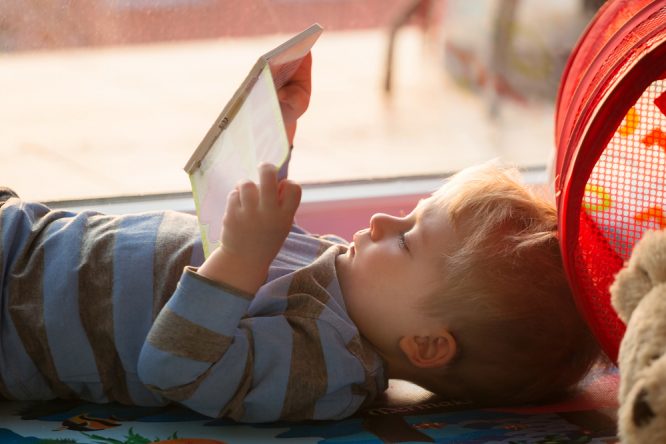When parents were asked to share one magic wish for early learning, parent Catherine, hoped for more access to books for kids. Here’s an article for why this is so critical for early learning and development. Journalist and parent, Amy K. Williams explores some of the reasons in this guest post.
The Importance of Reading to Babies and Toddlers
 We all know the importance of holding our babies, feeding them, bathing them, and basically meeting their every need. Reading to them has recently become recognized as one of those needs. Your first thought may be, why should I read to him before he can even talk (or hold his head up, for that matter)? But think about it. We don’t wait until babies can speak before we talk to them. We sing to them long before they are capable of mimicking a lullaby. Studies have shown reading to them from a very early age is one of the best things you can do for your child in terms of language and literacy skills, overall brain development and thinking skills, and establishing healthy social-emotional relationships.
We all know the importance of holding our babies, feeding them, bathing them, and basically meeting their every need. Reading to them has recently become recognized as one of those needs. Your first thought may be, why should I read to him before he can even talk (or hold his head up, for that matter)? But think about it. We don’t wait until babies can speak before we talk to them. We sing to them long before they are capable of mimicking a lullaby. Studies have shown reading to them from a very early age is one of the best things you can do for your child in terms of language and literacy skills, overall brain development and thinking skills, and establishing healthy social-emotional relationships.
When broken down even more specifically, reading aloud to your child teaches him about the world around him. It teaches him about communication with inflection and tone of voice, as well as building his vocabulary, listening, and memory skills. It also introduces important concepts such as letters, numbers, shapes, and colors in an appealing way. Even better, the more you read to them, the more you reinforce all of the above skills.
As a matter of fact, just hearing words aloud helps build a communication network in your baby’s brain. By the end of his first year, he will have been exposed to all the sounds needed to speak his native language. Children who are read to regularly know more words by age two than their counterparts who have not been read to, and they are more likely to learn to read at the appropriate developmental time and do well in school.
 Additionally, as you read to your child while snuggling them, you are building and strengthening the parent-child bond. The first two years of life are a critical period for child development in establishing literacy skills and nurturing the much-needed intersocial human connection. The American Academy of Pediatrics states, “Reading regularly with young children stimulates optimal patterns of brain development and strengthens parent-child relationships at a critical time in child development, which, in turn, builds language, literacy, and social-emotional skills that last a lifetime.” Plus, your baby loves the sound of your voice and feeling you close. Listening to you read provides them cues for expressive sounds and different emotions, which promotes both social and emotional development. As baby gets older, he can point to pictures, mimic sounds, and even ask questions to further build thinking and comprehension skills.
Additionally, as you read to your child while snuggling them, you are building and strengthening the parent-child bond. The first two years of life are a critical period for child development in establishing literacy skills and nurturing the much-needed intersocial human connection. The American Academy of Pediatrics states, “Reading regularly with young children stimulates optimal patterns of brain development and strengthens parent-child relationships at a critical time in child development, which, in turn, builds language, literacy, and social-emotional skills that last a lifetime.” Plus, your baby loves the sound of your voice and feeling you close. Listening to you read provides them cues for expressive sounds and different emotions, which promotes both social and emotional development. As baby gets older, he can point to pictures, mimic sounds, and even ask questions to further build thinking and comprehension skills.
 The more you read to your kids, the more benefit provided. Whether you read them old classics passed down from your childhood, or new favorites of their own, they will reap the benefits by developing higher literacy and communications skills. Equally as important, they will come to connect reading with you to a sense of enjoyment and pleasure. This increases the likelihood of instilling strong literacy and language skills, as well encouraging them to become lifelong readers and learners.
The more you read to your kids, the more benefit provided. Whether you read them old classics passed down from your childhood, or new favorites of their own, they will reap the benefits by developing higher literacy and communications skills. Equally as important, they will come to connect reading with you to a sense of enjoyment and pleasure. This increases the likelihood of instilling strong literacy and language skills, as well encouraging them to become lifelong readers and learners.
 Amy Kristine Williams is a free-lance journalist based in Southern California and mother of two. She enjoys spreading the word on positive parenting techniques in the digital age and is passionate about writing. Thank you, Amy, for your guest blog on 123kindergarten.com.
Amy Kristine Williams is a free-lance journalist based in Southern California and mother of two. She enjoys spreading the word on positive parenting techniques in the digital age and is passionate about writing. Thank you, Amy, for your guest blog on 123kindergarten.com.
**************************************************************************
I sure love when my blog and posts resonate with others. Parents Mel and James reached out with some information on their website: Babies Like. Here is a link to that:
https://www.babieslike.com/reading-to-baby-benefits/
No matter what language you speak at home, read to your child in that language too. This also develops the connection between words and print. Besides learning to speak a language, reading one will be one of the most critical skills your child builds. And while Mel advises reading to newborns, you don’t have to wait for that event. Moms can sit down with a book and enjoy reading time for babies before they are even born. Dads can read to moms’ bellies too. Even in utero, babies are learning the rhythm and sounds of language and early brain connections are already forming. Did you know newborn babies cry with an accent? That of the language s/he has heard most before birth. So, take a few minutes. Install the lap-app (sit down, open a book, and cuddle a kidlet on your lap) and READ!
